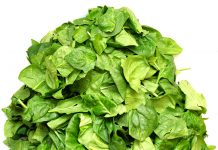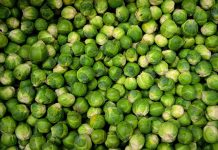
I recently had a medical examination. The only problem that turned up was low iron. I forget the units, but my hemoglobin was 12.1. The doctor told me I should be 14 or more (for men). I hadn’t thought I had a problem since I regularly donate blood. I have since found out that the Red Cross limit is 12, so I suppose I have just barely been making that.
I am a vegetarian and told the doctor and she gave me some iron pills to take. They will measure my blood again in a few weeks and see if my hemoglobin has improved.
So now my question: what should I eat and not eat to maximize absorption of the ferrous sulfate supplements in the short time I have? I’d like to know about anything that helps, even a little and anything that blocks absorption, even a little.
Thank you very much for your pages and your help.
First of all, quit donating blood until your hemoglobin gets back to the norm for men which is 14.0 to 18.0 grams/deciliter. That was probably obvious to you.
Iron is very important because it is responsible for transporting oxygen to muscles and organs, including your brain. If the iron content of the blood falls, a person may feel tired or have little energy, but that may not happen until the hemoglobin falls below 10 gm/dl.
Ironically, the body recycles iron from red blood cells as cells age and rupture, but iron is not often lost in males unless there is an injury where blood is lost or donated. Red blood cells last 120 days, so your hemoglobin turns over every 4 months. Your need for iron will be continuous.
Vegetarians often have a normal hemoglobin, but low iron stores (ferritin) in liver, muscles and bone marrow. Iron absorption is improved by including vitamin C (75 milligrams per meal or about 6 ounces orange juice) along with an iron supplement (as much as 50 mg per day) and high iron foods. The ferrous form of iron is more absorbable than ferric.
Unfortunately, iron supplements often cause constipation. To offset that side effect, make sure you eat sufficient fiber (11.5 grams per 1,000 calories consumed) and drink enough water.
Phytates and oxalates can interfere with iron absorption from the gut, but the research is not conclusive on this subject. Phytates are found in bran and whole grains. Oxalates are high in a nut and nut butter, beets and beet greens, tea, strawberries, gelatin, rhubarb, spinach, chocolate and wheat bran. Most of these foods are the very substance of a vegetarian diet.
Iron in non-meat foods is called non-heme iron. Vegetarians should eat dark green leafy vegetables, broccoli, legumes, yeast-leavened whole grain bread, iron-enriched pasta, rice and cereal and meat analogs which are high in iron. Unfortunately, the iron in these foods is not as absorbable as the iron in meat.
But foods rich in vitamin C (papaya, orange, cantaloupe, broccoli, Brussel sprouts, raw green peppers, grapefruit, strawberries, etc.) can be as effective as meat meals in improving iron absorption. Remember though sunlight and heat destroy that vitamin C.
A diet high in milk or milk products can increase iron deficiency because these are high protein, low iron foods and filling. There are soy beverages high in iron available (also iron-fortified infant soy formulas) that you could drink. Look for one to compliment your vegetarian diet.
Cook in cast iron pans as that may increase the iron content of your diet. However, this form of iron is not absorbed very well.
Tetracycline is often used to treat acne or infection, interfere with iron absorption.



